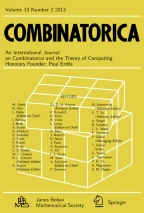Abstract
Combinatorial property testing, initiated by Rubinfeld and Sudan [23] and formally defined by Goldreich, Goldwasser and Ron in [18], deals with the following relaxation of decision problems: Given a fixed property P and an input f, distinguish between the case that f satisfies P, and the case that no input that differs from f in less than some fixed fraction of the places satisfies P. An (ε, q)-test for P is a randomized algorithm that queries at most q places of an input f and distinguishes with probability 2/3 between the case that f has the property and the case that at least an ε-fraction of the places of f need to be changed in order for it to have the property.
Here we concentrate on labeled, d-dimensional grids, where the grid is viewed as a partially ordered set (poset) in the standard way (i.e. as a product order of total orders). The main result here presents an (ε, poly(1/ε))-test for every property of 0/1 labeled, d-dimensional grids that is characterized by a finite collection of forbidden induced posets. Such properties include the “monotonicity” property studied in [9,8,13], other more complicated forbidden chain patterns, and general forbidden poset patterns. We also present a (less efficient) test for such properties of labeled grids with larger fixed size alphabets. All the above tests have in addition a 1-sided error probability. This class of properties is related to properties that are defined by certain first order formulae with no quantifier alternation over the syntax containing the grid order relations.
We also show that with one quantifier alternation, a certain property can be defined, for which no test with query complexity of O(n 1/4) (for a small enough fixed ε) exists. The above results identify new classes of properties that are defined by means of restricted logics, and that are efficiently testable. They also lay out a platform that bridges some previous results.
Similar content being viewed by others
References
N. Alon, E. Fischer, M. Krivelevich and M. Szegedy: Efficient testing of large graphs, Combinatorica 20(4) (2000), 451–476.
N. Alon, E. Fischer and I. Newman: Testing of bipartite graph properties, SIAM J. of Computing, to appear.
N. Alon, M. Krivelevich, I. Newman and M. Szegedy: Regular languages are testable with a constant number of queries, SIAM J. of Computing 30(6) (2000), 1842–1862.
S. Arora, C. Lund, R. Motwani, M. Sudan and M. Szegedy: Proof verification and the hardness of approximation problems, JACM 45(3) (1998), 501–555.
T. Batu, R. Rubinfeld, P. White: Fast approximate PCPs for multidimensional bin-packing problems, in: RANDOM-APPROX99 Conference Proceedings, pages 245–256, 1999.
M. Blum, M. Luby and R. Rubinfeld: Self-testing/correcting with applications to numerical problems, JCSS 47(3) (1993), 549–595.
R. Diestel: Graph Theory (2nd edition), Springer, 2000.
Y. Dodis, O. Goldreich, E. Lehman, S. Raskhodnikova, D. Ron and A. Samorodnitsky: Improved testing algorithms for monotonicity, in: 3rd RANDOM Conference Proceedings, pages 97–108, Springer-Verlag, Berkeley CA, 1999.
F. Ergün, S. Kannan, S. R. Kumar, R. Rubinfeld and M. Vviswanathan: Spot checkers, JCSS 60(3) (2000), 717–751.
E. Fischer: On the strength of comparisons in property testing, Information and Computation 189 (2004), 107–116.
E. Fischer: Testing graphs for colorability properties, in: 12th SODA Conference Proceedings, pages 873–882, 2001. Also: Random Structures and Algorithms 26(3) (2005), 289–309.
E. Fischer: The art of uninformed decisions: A primer to property testing; Computational Complexity Column, The Bulletin of the European Association for Theoretical Computer Science 75 (2001), 97–126.
E. Fischer, E. Lehman, I. Newman, S. Raskhodnikova, R. Rubinfeld and A. Samorodnitsky: Monotonicity testing over general poest domains, in: 34th ACM STOC Conference Proceedings, pages 474–483, 2002.
E. Fischer and I. Newman: Testing of matrix properties, in: 33rd ACM STOC Conference Proceedings, pages 286–295, 2001.
E. Fischer, I. Newman and J. Sgall: Functions that have read-twice constant width branching programs are not necessarily testable, Random Structures and Algorithms 24(2) (2004), 175–193.
P. Gemmell, R. Lipton, R. Rubinfeld, M. Sudan and A. Wigderson: Self-testing/correcting for polynomials and for approximate functions, in: 23rd ACM STOC Conference Proceedings, pages 32–42, 1991.
O. Goldreich, S. Goldwasser, E. Lehman, D. Ron and A. Samorodnitsky: Testing monotonicity, Combinatorica 20(3) (2000), 301–337.
O. Goldreich, S. Goldwasser and D. Ron: Property testing and its connections to learning and approximation, JACM 45(4) (1998), 653–750.
O. Goldreich and D. Ron: Property testing in bounded degree graphs. Algorithmica 32(2) (2002), 302–343.
T. Kővári, V. T. Sós and P. Turán: On a problem of K. Zarankiewicz, Colloq. Math. 3 (1954), 50–57.
I. Newman: Testing membership in languages that have small width branching programs, SIAM J. of Computing 31(5) (2002), 1557–1570.
D. Ron: Property testing (a tutorial), in: Handbook of Randomized Computing (S. Rajasekaran, P. M. Pardalos, J. H. Reif and J. D. P. Rolim eds.), Vol. II, Chapter 15, Kluwer Press, 2001.
R. Rubinfeld and M. Sudan: Robust characterization of polynomials with applications to program testing, SIAM J. of Computing 25(2) (1996), 252–271.
E. Szemerédi: Regular partitions of graphs, in: Proc. Colloque Inter. CNRS No. 260 (J. C. Bermond, J. C. Fournier, M. Las Vergnas and D. Sotteau eds.), pages 399–401, 1978.
A. C. Yao: Probabilistic computation, towards a unified measure of complexity; in: 18th IEEE FOCS Conference Proceedings, pages 222–227, 1977.
K. Zarankiewicz: Problem P 101, Colloq. Math. 2 (1951), 116–131.
Author information
Authors and Affiliations
Corresponding author
Additional information
A preliminary version of these results formed part of [14].
Research supported in part by grant 55/03 from the Israel Science Foundation.
